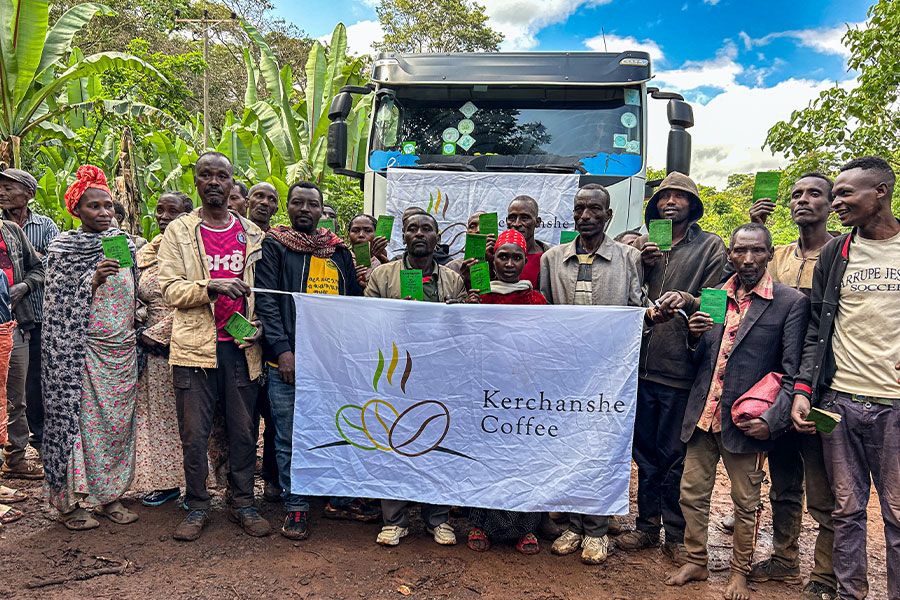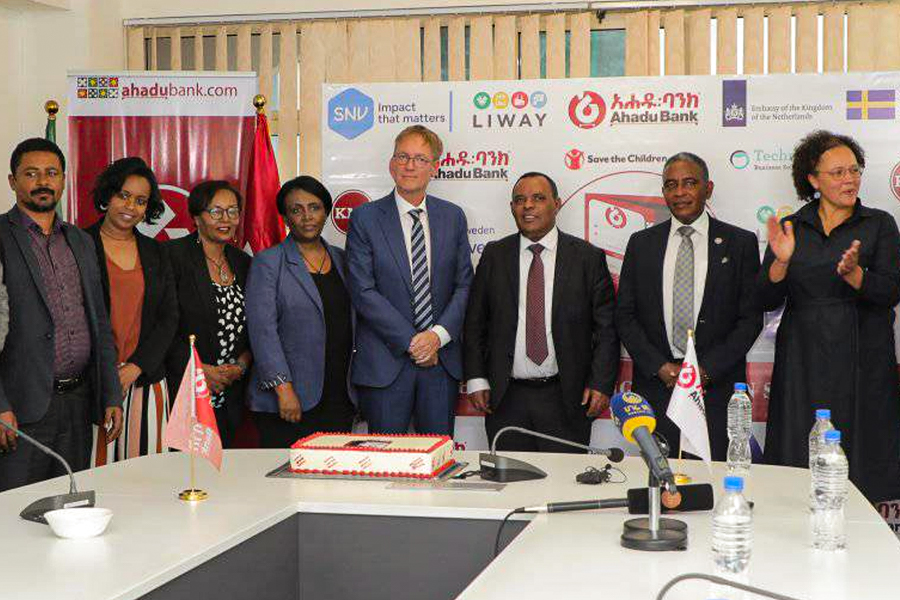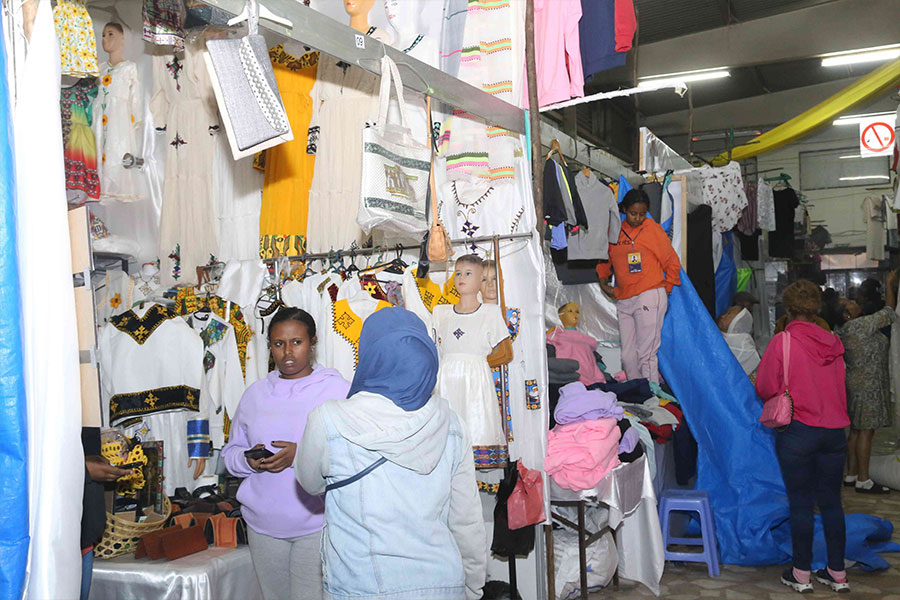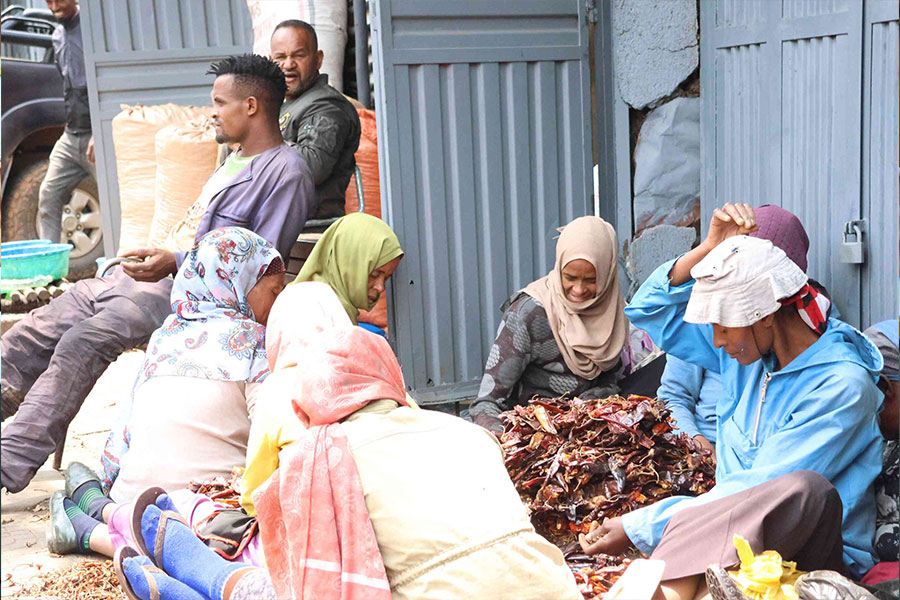
Radar | Aug 21,2023
Jun 22 , 2024.
Ethiopia’s economic reality is a study in contrasts. Positive signs, such as declining inflation rates for food and non-food items, could imply that monetary policy measures might have restrained price escalations. According to official data from the Ethiopian Statistics Services, food inflation has steadily decreased to 20pc from 34.4pc last year, while non-food inflation has dropped by 10.5 percentage points to 18pc. The trend, observed over the past year, could have economic implications and hints at a monetary policy management taken after Mamo Mehiretu took over the helm at the central bank last year have begun to yield.
However, the budget bill tabled before federal legislators reveals troubling shifts.
An expansion with a 21.1pc increase in a total outlay of nearly one trillion Birr, yet almost half of the fiscal growth is directed toward debt repayment. The focus budget architects, such as Finance Minister Ahmed Shide and his deputy, Eyob Tekalegn (PhD), granted the fiscal year 2024/25 budget overshadows the north-of-20pc inflation rate, eroding the Birr’s purchasing power. The looming possibility of a currency devaluation introduces another layer of complexity that budget formulators have largely sidestepped.
Last year’s budget of 801.6 billion Br included a historic allocation of 159 billion Br for debt repayment. Yet, it failed to prevent the country from defaulting on a one billion dollar Eurobond coupon payment in December last year. Whether or not devaluation occurs, a sustainable fiscal strategy must be predicated on optimising the economy's long-term productivity.
The long-awaited credit facility negotiated with the International Monetary Fund (IMF), though tied to stringent reforms, will mean little without a comprehensive overhaul in the administration of the federal finances. A sustainable debt management requires more than a restructuring schedule, as the G-20 common framework offers. The fundamental principles should be open and inclusive dialogue and negotiated political settlements to address structural economic impediments.
Macroeconomic instability is rooted in profound systemic inadequacies that could be exacerbated by a lack of fiscal discipline, disregard for priorities, and utter lack of accountability in public spending. A recent audit revealed that only 11pc of the 443 million Br receivable from 92 federal offices were returned. The number of federal agencies with satisfactory audit findings dropped by 15 to 50 last year. Close to 30 agencies were found to have made payments outside their mandates, while 11 made 43 million Br in unaccounted expenditures.
A budgetary shift from appearances of prosperity to real economic growth should be crucial. However, judging by the budget bill before Parliament, the Prosperitans appear to want to risk long-term economic health for short-term relief. Legislators should thoroughly review the budget bill before voting, incorporating findings reported by the Auditor General, Meseret Damtie, historical context, and the experiences from neighbouring countries.
The budget's aspiration to broaden the tax base, targeting 58pc of the 563 billion Br revenues planned from domestic sources, should raise legislators' eyebrows. The diminishing confidence among businesses in the administrative apparatus should be alarming. Nearly 450 factories ceased operations last year due to issues arising from taxes, security concerns, and lack of finance. Property taxes, an expanded list of VAT levies, and the introduction of excise stamps will undoubtedly impose new financial burdens on businesses and exacerbate social instability.
The administration’s reliance on domestic revenue sources, such as treasury bonds and bills, will be of little solace to the 15 million Ethiopians needing emergency assistance if food production remains stagnant. The policy preference to introduce taxes on the struggling agricultural sector, driven by a budget deficit accounting for 2.1pc of GDP, further illustrates the unsustainable foundation for financing.
Over the past five years, the federal government's budget allocation to pro-poor sectors has undergone notable changes, causing concerns about the country's development priorities. Agriculture, a sector vital to the livelihood of a large portion of the population, has seen its budget share plummet from 19.3pc in 2019/20 to 11.9pc this year. The reduction risks undermining efforts to boost agricultural productivity, potentially worsening poverty and food insecurity in rural areas.
Health spending may have remained relatively stable, fluctuating between three and five percent of GDP. While maintaining these funding levels has allowed for continued gains in healthcare outcomes, the lack of substantial increases shows progress may be incremental rather than transformative. Given the ongoing battle with diseases and the need for better healthcare infrastructure, merely maintaining funding levels might not suffice.
Allocations to water and energy have also sharply declined, dropping almost by half to 3.4pc. The reduction could impede the development of essential infrastructure. Education, meanwhile, experienced a brief surge in funding from 19.5pc in 2019/20 to 21.1pc in 2021/22, only to plummet to 9.7pc in 2023/24. The initial increase indicated a recognition of the need to invest in human capital, but the subsequent drop suggests potential neglect. Consistent investment in education is crucial for equipping the workforce with skills necessary for economic growth and development, driving innovation, improving productivity, and attracting foreign investment.
Road construction has remained a relatively stable priority, with budget allocations fluctuating around 19pc to 20pc; and, a slight increase in the most recent year. This stability ensures ongoing development in transportation infrastructure, which is essential for economic activities and connecting remote areas to markets. However, the benefits of improved infrastructure will be limited if other pressing issues like political grievances and economic marginalisation leading to armed conflicts remain unaddressed.
In contrast, the defence budget had surged dramatically. It almost quadrupled in 2022/23 to 84 billion Br from 22 billion Br the previous year. Although it decreased to 50 billion Br in the outgoing fiscal year, the latest budget allocates 65.7 billion Br for military expenditure, accounting for almost nine percent of the total budget.
The declining budget share for agriculture and education could have severe implications for the country's rural development and the productivity of its population. Consistent investment in these sectors is essential as the economy transitions from an agrarian-based to a more diversified one. The needed balance between military spending and investment in pro-poor sectors should be at the crux of the debate in Parliament.
Aside from these trends, the exchange rates of major currencies against the Birr in both the official and parallel markets have shown alarming patterns. The exchange rate at the official market has exhibited a steady upward trend, indicating a devaluation of the Birr against the Dollar and other currencies such as the Euro and Pound Sterling. The parallel market, however, has shown more volatility with a sharper upward trend, reflecting a larger devaluation.
The persistent devaluation of the Birr can have several economic implications. A weaker currency makes imports more expensive, contributing to inflationary pressures. It offsets some of the gains of declining inflation rates in food and non-food items, as higher import costs lead to higher prices for goods and services.
A vast disparity between official and parallel market rates - more than 100pc - exposes a lack of confidence in the official exchange rate policy. It distorts the market, undermining monetary policy implementations and deepening macroeconomic instability. When businesses and individuals prefer the parallel market over official channels, it is an indictment of the government’s economic policies. It can lead to a vicious cycle where the official exchange rate becomes increasingly disconnected from reality, further eroding confidence and leading to capital flight.
The Birr's continuous loss of value against other major currencies reveals unresolved issues with the country's foreign exchange reserves. Adequate reserves are essential for managing external debt and ensuring the country imports essential goods. The Birr's persistent devaluation shows that these reserves are under strain, which could have broader economic stability and growth factors. As the value of the Birr keeps falling, the cost of servicing foreign debt rises. Cuts in public spending or increases in taxes, both of which negatively impact economic growth, are in store.
Policymakers need to adopt an approach that balances immediate economic stability with long-term growth objectives. This should mean managing inflation and maintaining stable public investment in infrastructure while ensuring adequate funding for agriculture and education, which is vital for the country’s future. Without such a balanced approach, economic instability and stagnation risks remain high, threatening the prospect of progress.
Legislators should ensure that the budget's overriding political purpose serves these dual objectives.
PUBLISHED ON
Jun 22,2024 [ VOL
25 , NO
1260]

Radar | Aug 21,2023

Advertorials | May 30,2025

Radar | Jan 15,2022

Radar | Dec 15,2024

Radar | Oct 12,2024

Radar | Jul 17,2022

Agenda | Sep 10,2022

Agenda | Jul 06,2025

Fortune News | Nov 03,2024

Fortune News | May 09,2020

Photo Gallery | 175673 Views | May 06,2019

Photo Gallery | 165893 Views | Apr 26,2019

Photo Gallery | 156282 Views | Oct 06,2021

My Opinion | 136839 Views | Aug 14,2021

Dec 22 , 2024 . By TIZITA SHEWAFERAW
Charged with transforming colossal state-owned enterprises into modern and competitiv...

Aug 18 , 2024 . By AKSAH ITALO
Although predictable Yonas Zerihun's job in the ride-hailing service is not immune to...

Jul 28 , 2024 . By TIZITA SHEWAFERAW
Unhabitual, perhaps too many, Samuel Gebreyohannes, 38, used to occasionally enjoy a couple of beers at breakfast. However, he recently swit...

Jul 13 , 2024 . By AKSAH ITALO
Investors who rely on tractors, trucks, and field vehicles for commuting, transporting commodities, and f...

Oct 18 , 2025 . By NAHOM AYELE
In a sweeping reform that upends nearly a decade of uniform health insurance contribu...

A bill that could transform the nutritional state sits in a limbo, even as the countr...

Oct 18 , 2025 . By SURAFEL MULUGETA
A long-planned directive to curb carbon emissions from fossil-fuel-powered vehicles h...

Oct 18 , 2025 . By BEZAWIT HULUAGER
Transaction advisors working with companies that hold over a quarter of a billion Bir...